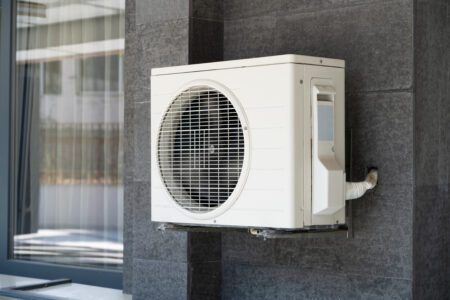While heat pumps use electricity, they produce up to three to four times more heat energy than the electricity they consume. Rather than turning electricity into heat like a space heater, heat pumps work by moving heat around. This makes them much more efficient than space heaters. To help you understand the efficiency ratings of heat pumps, our HVAC professionals at Environmental Heating & Air Solutions in Roseville, CA, have written this guide to the efficiency of modern heat pumps.
How Heat Pumps Work
Heat pumps serve as both heating and cooling systems. In the summer, your home’s heat pump works by moving hot air inside your home outdoors. During the cooler months, your heat pump works oppositely by moving warm air from outside into your home to heat it. The way that heat pumps work means their efficiency ratings include separate ones for heating and cooling, which are calculated differently.
For residential heat pumps, the Seasonal Energy Efficiency Rating 2 (SEER2) is the metric used to describe the efficiency of heat pumps while operating in cooling mode. When a heat pump is operating in heating mode, the Heating Seasonal Performance Ratio 2 (HSPR2) is the metric used to describe the heat pump’s efficiency while operating in heating mode.
A separate rating, called the Coefficient of Performance (COP), is used to describe the efficiency of a geothermal heat pump while operating in heating mode. When it operates in cooling mode, the metric used to describe its efficiency is the Energy Efficiency Ratio 2 (EER2) rating.
SEER2 Air-Source Heat Pump Ratings and Cooling Efficiency
Heat pump SEER2 ratings measure how efficient the system is when it operates in cooling mode. This metric is also used to describe the efficiency of central air conditioners, and higher numbers mean greater energy efficiency.
SEER2 measures the total heat the heat pump removes while in cooling mode divided by the time in hours the system operates, while taking into account the temperature variation that typically occurs during the season. The U.S. Department of Energy (DOE) says the minimum allowable SEER2 efficiency rating for residential heat pumps is 14.3. Heat pumps with SEER2 ratings of 17 or higher are considered highly efficient, with ratings going up to 22.
The DOE has raised the minimum SEER2 ratings over the past few decades. If your home has an older heat pump with a low SEER rating, upgrading your system to a modern heat pump with a high SEER2 rating could save you significant dollars on your cooling bills.
HSPF2 Air-Source Heat Pump Ratings and Energy Efficiency
The HSPF2 rating for your heat pump describes its energy efficiency while operating in heating mode. Higher numbers correspond to greater energy efficiency while heating your home.
Calculating this metric involves comparing the total heat produced for your home with how much electricity the heat pump uses while taking into account the various temperatures that occur during the season. The DOE has established a minimum HSPF2 rating of 7.5 for residential heat pumps. Those with HSPF2 ratings of 9 or above are highly efficient, with the highest HSPF2 rating being 10.5.
EER2 Geothermal Heat Pump Ratings and Energy Efficiency
The Energy Efficiency Ratio 2 (EER2) is the metric used to describe a geothermal heat pump’s efficiency while cooling your home. While this metric is similar to the SEER2 rating, it measures the heat pump’s efficiency at a single temperature instead of varying ones. This is because ground or water temperatures do not vary as much as air temperatures do outdoors. The DOE has set a minimum EER2 rating of 14.1 for closed-loop geothermal heat pumps, with high-efficiency models ranging up to 30.0 EER2.
COP Geothermal Heat Pump Ratings and Energy Efficiency
A geothermal heat pump’s efficiency while operating in heating mode is described by COP ratings. This is measured at a single temperature instead of varying ones since the ground or water temperatures don’t fluctuate as much as air. The DOE has set a minimum COP rating for geothermal heat pumps at 3.1, with high-efficiency models ranging up to 4.5 or more.
Other Factors That Can Affect Heat Pump Efficiency
Several factors that affect the efficiency of a heat pump include:
- Air-source vs. geothermal heat pumps
- Ductwork in the home
- Climate
- Size
Air-Source vs. Geothermal
Air-source models transfer heat from outside to warm your home during the winter. These systems are typically less expensive than geothermal heat pumps and cheaper to install. However, their energy efficiency is lower.
Geothermal ground-source heat pumps draw heat from the ground to heat your home or move heat from inside and transfer it to the ground to cool your home. While these heat pump systems are typically more energy-efficient than air-source heat pumps, they are also more expensive to install. Similarly, geothermal water-source heat pumps draw heat energy from water and transfer it into your home or move warm air out of your home and transfer it to the water source to cool your home. Like ground-source systems, they are more expensive to install than air-source heat pumps but have greater energy efficiency.
Your Home’s Ductwork
Your home’s ductwork can affect the energy efficiency of your heat pump. If you have an older home without ductwork, or it is in bad shape, you could opt for ductless mini-splits. These can be more expensive than an air-source ducted heat pump but don’t require ductwork.
Climate
Heat pumps work best in areas with moderate temperatures. When the temperature drops below 25 degrees Fahrenheit, the heat pump will use more electricity to deliver heat. This will result in higher heating bills. Because of this, air-source heat pumps come with an additional heat source. In a hot climate, a heat pump will have to work harder to keep your home cool.
Heat pumps dehumidify the air better than most air conditioners because they run constantly and at varying speeds. This makes a high-efficiency heat pump a good choice for humid climates.
Size
Your heat pump’s efficiency will be affected by the size of your home. If you have a large home, you’ll need a heat pump with a greater capacity. Our HVAC technicians at Environmental Heating & Air Solutions can ensure proper sizing.
An undersized heat pump will not be effective at heating or cooling your home to the desired temperature. Due to it having to run continuously while it tries to meet your thermostat’s setting, an undersized unit will lead to higher utility bills.
By contrast, a unit that is too large will quickly cool or heat your home before turning off only to turn back on once it needs to heat or cool the space again. This is hard on the heat pump’s components and is not energy efficient.
Talk To Our HVAC Professionals
Choosing a heat pump with high efficiency ratings can result in substantial savings on your utility bills. However, you should consult our HVAC professionals to ensure you choose the right system for your home. We provide a broad range of HVAC services, including AC installation, repair and maintenance; as well as furnace installation, repair and maintenance; heat pump installation, repair and maintenance; and more.
To learn more about our services, contact us at Environmental Heating & Air Solutions in Roseville, CA, today.

